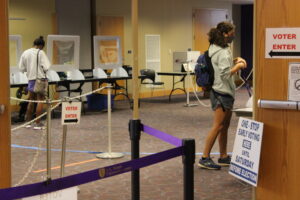
District 119 Republican candidate Mike Clampitt.
In an email interview with WCJ, District 119 NC House candidate Mike Clampitt said that he would prefer that WCU students not vote in this district. Clampitt believes that most students should, in fact, vote where their parents live.
According to Cory Vaillancourt, a reporter from Smoky Mountain News, Clampitt had advocated for a bill, after he lost the 2018 election, that would limit the number of college students voting in Cullowhee.
“Everyone that is of age and a legal citizen of this county has the right to vote—but they should be voting from where they are domiciled,” said Clampitt in an email. “There should not be the cultivating or farming of temporary persons to vote when they have a domicile in another location. A national database thru states BOE’s should establish their legal validity to vote. It is my belief that there should be a review of the North Carolina residence policy for voting and a voter identification requirement (as was passed by the voters in 2018 to include Voter ID as part of our State Constitution). A person may have more than one residence, but they only have one domicile. This issue has been addressed by our state Board of Elections in the past. But, it has been screened and overlooked intentionally.”
Clampitt agrees that most college students’ “domicile” is their parent’s home. This means that Clampitt believes that most Western students should not vote in his district.
WCJ then asked WCU students what their thoughts are on Clampitt’s views on where they should vote.
“As a student who lives a majority of the year on campus, [we] should have the opportunity to vote in the county that we live in a majority of the year,” said Michelle Medina, a senior. “[The local elections affect] the future generations that are going to be here, when you graduate from a certain institution usually you’ll want your kids to go there or at least to look back and have pride in where you came from and the progress that has been made there.”

Early voting is underway in the 2020 election. Photo by Nate Hadley.
Some students cited financial and travel logistics as concerns because it can be expensive and difficult to go home and vote in person.
“I feel like students may not have the opportunity to vote in their local elections, so voting here gives them the opportunity to have their voices heard,” said Olivia Ramos, a sophomore.
The students interviewed all felt that they have some interest in the community they live in, and they felt that what they are voting on in Cullowhee will impact their lives.
“I disagree [with Clampitt], college students are living in the town, they are having to deal with what goes on in it, so I think that they should be able to vote in the local elections,” said Mia DiTommaso, a sophomore.
Other students admit that they prefer voting elsewhere but acknowledge that it may not be the case for all students.
“Personally, I voted back home because I’m passionate about what happens there. But not everybody does that. Some people consider this their home, and they should be able to vote here,” said Malaika Newsome, a junior.
Other students expressed concerns about voter apathy among college students and how making voting less accessible will make that problem worse.
“It’s already hard enough to get college students to vote. Making it harder will waste a lot of votes,” said Katie Smith, a senior.
Out of the roughly 10 students interviewed by WCJ, no student favored Clampitt’s view on domicile voting.
This story was written for the 2020 Elections Coverage class.


